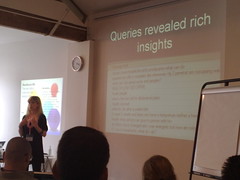MEX: Sian Townsend, Google
Going to talk about 5 elements of a successful emerging market strategy. Personal views, with examples from Google.
What happens when you hand someone a mobile and say "you can ask a question and get an answer"?
In East Africa...
Want to know how ebola is spread. If HIV can be cured. What drug is best for malaria. How to stop vines wilting. Whether panadol effects outcome of an HIV test. Why tomatoes wilt. Why feet smell.
Local solutions to local problems.
Sian is a user experience researcher at Google, focused on mobile search, internationally. Background in HCI and development politics.
1. Don't presume you know the answers.
Search has been rolled out in African languages and by SMS. "Suggest in Swahili" was launched last week, getting around problems with user input.
2. Collaborate
G mapped lots of African countries that hadn't been mapped at all. Where we don't have data we encourage others to contribute. We allow users to create maps themselves. Local users can annotate areas and contribute data really well.
With search, we have "Google in your language" - 38 languages translated by locals.
3. Take a long term view
Google works with universities to nurture cutting edge research; runs competitions to challenge students and understand what kind of content appetites new users in the domain have - letting them show us the way forward.
Invested in infrastructure, improving connectivity. Google.org is another avenue for them to get involved. A broad strategy; "a rising tide lifts all boats"
Research from Uganda. Localising your own product may be missing the point - you might benefit from doing something new, and strategic user research is the way to find out if this is the case.
Right now, most Google searches are W. Europe and N. America. Mobile will be the future; but it's messy and not a simple case of "just moving everything over". In Africa, designing mobile products is tough: simple devices, few data plans, widespread prepay. There's v little digital content - even with fantastic connectivity, what will you search for in your local language if nothing's digitised?
Research project in E Africa: 4 weeks ethnographic research by an academic, focus groups showing 20 concepts through a network of village phone operators, and a Wizard of Oz experiment (where you don't know if you're talking to a human or a machine). A social impact assessment ran alongside all of these to ensure we were being socially responsible.
Wizard of Oz experiment was about exploring local content appetites, collecting data quickly and evaluating mobile as a channel. Set up a control centre, trained 12 field researchers to go out into the field: 17 locations, let end-users ask questions. They used Frontline SMS and a GSM Modem to gather messages and respond to health questions.
Queries revealed rich insights. Multi-linguistic teams were used to ensure questions were asked in a language the asker was comfortable using. Manually matched up conversations to do analysis (quantitative data), they mapped the research data into user journeys to get qualitative data.
Built prototypes off the back of this, going into product pilots. Tested, learned, iterated - particularly important for SMS products where you have to spend a lot of time analysing logs to look for synonyms etc.
They will be launching a suite of products off the back of this research.
5. Embrace local ingenuity
With the best intentions, designs done by outsiders can be subverted - this is OK and is one of the exciting things about emerging markets. Some villages, for instance, don't have a local phone - enterprising businessfolks buy a phone and drive it around these villages in a bike.
Shows an "analog blogger" - guy who has a network of news reporters. He writes it on a chalk board and has customers come and view it. He runs advertising on the board :)
Q: How did literacy play a part in your studies? Were maps the way that people represented space in African cultures?
A: The only way to discover this is by giving someone a phone. Government statistics aren't as reliable as seeing what people want to do and how they do it. On maps: don't know, I'm focused on search. My guess would be that lots of people use other representations.

